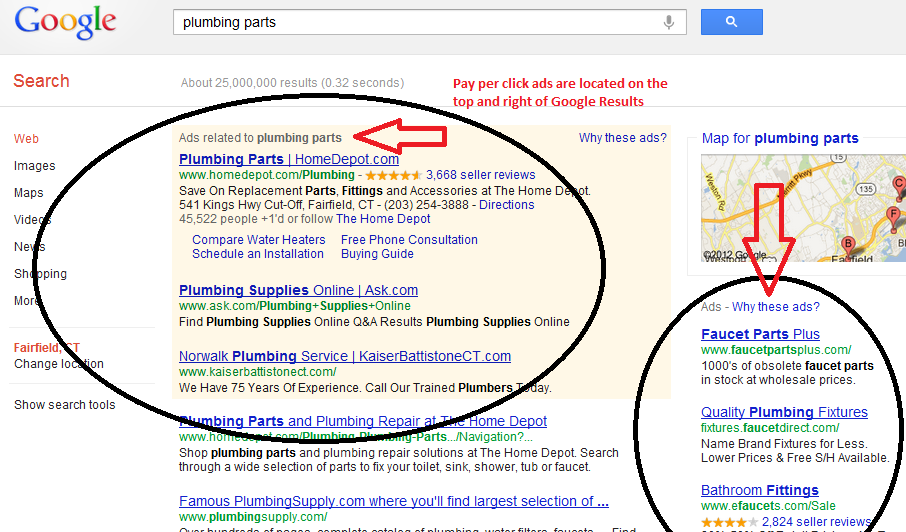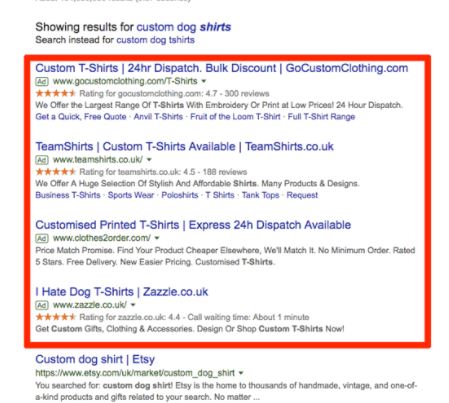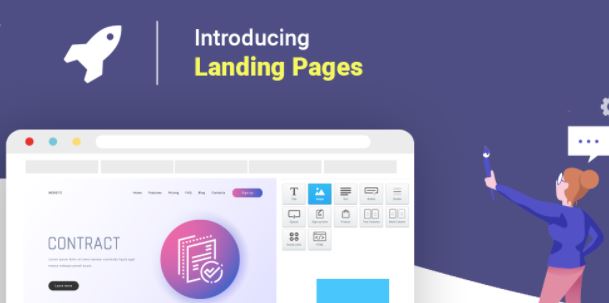
Table of Contents
The Basics of Pay Per Click Advertising
Pay per click is a form of advertising where you are able to highly target advertising to customers who are searching for keywords that match your offer.
This is a look in-depth as to what pay per click is, what the benefit to your online marketing effort is and how best to leverage pay per click to give you the best bang for your buck.

Pay per click is a form of online advertising in which you display an advert on a website based on a bid price, for which you only pay once your advert has been clicked (the visitor has been to your website). This is a great mechanism to use in order to get visitors to your website quickly and cost-effectively. It is a low-cost way to generate traffic because you only pay for traffic that actually arrives at your website and, if you use this traffic effectively, you can then make sales immediately, which offsets the original advertising costs.
Pay per click is also known as CPC (Cost Per Click) advertising.
One of the most obvious uses of PPC advertising is on Google’s search results page. The image on the right shows the PPC adverts surrounded by the read outlines. Google labels the PPC adverts on its search results as ‘Sponsored Links’. You can see similar PPC adverts on Yahoo search results as well.
PPC advertising is not limited to search engine result pages. PPC adverts are advertised on a number of websites all across the internet. Most of these websites use PPC services supplied by one of the big players, namely Google, Yahoo! Search Marketing, and Microsoft AdCenter.
Advertising on a PPC service is done by bidding an amount per click for a keyword or key phrase. Your bid is then compared to other bids by other advertisers on the same keywords, this is then used to determine the position your advert is displayed compared to other adverts. This is a very simple explanation of the bidding which I will cover in more detail in a follow-up post.
The major benefit behind PPC is that your advertising is usually highly targeted if done correctly. Because you are able to buy keywords or phrases, you can buy only those phrases used by potential customers to find products or services you are offering. This results in visitors who are already looking for what you have to offer and subsequently means that those visitors are primed to become customers.
Why Use PPC Advertising?

Traditionally, the route to promoting your website focused on getting your website into the search engine’s organic results. What this means is that when a user searches on a particular set of keywords, your website would be visible in those results. This is still a very important objective but is extremely time-consuming mostly in that it takes a long time for search engines to list your website as well as the fact that search engines are using continually complex algorithms and methods to focus on quality websites that answer the user’s particular need at that time. The fact that your product or service is exactly what the user might be looking for is completely incidental.
Immediate visibility
So you have a great website with the answer to the search users’ woes, how do you get them to visit your website? PPC advertising is the rescue you need. Because PPC allows you to bid on advertising related to a select set of keywords or phrases, you are now able to buy your way into the search results page and get the traffic you need immediately. Not only can you buy into the search results page, but you can buy your way onto other websites in the same niche and therefore have users interested in the topic your product or service encompasses. Within no time, you are visible to users on the internet whether by search or through other websites.
Quality traffic
The fact that you are buying adverts based on keywords and phrases ensures that your ads are only being shown to users already interested in your topic. This is huge. You are not even going to be seen by users not already interested in your topic so when a user does click on your ad, he/she is already a qualified lead. Now that you have quality traffic, you just need to focus on turning readers into customers.
Extremely low cost to entry
Most keywords won’t cost you an arm and a leg to get advertising. There are some extremely popular keywords that have very high prices but if you are imaginative and think a little more about the specifics your potential customers might be looking for, it is often possible to still get good traffic without paying an enormous amount of money. Most importantly, PPC is advertising that you only pay for when the user actually clicks on your ad. It doesn’t matter how many people see the ad, it’s only those who take action, and come to your site, that you pay for. Convert that traffic into sales and your PPC campaign will pay for itself.
To summarise, PPC advertising can get you immediate traffic of qualified leads looking for your product or service at a very affordable cost.
How to Use PPC Advertising

Using pay-per-click services is a very large topic with many nuances that cannot be conveyed in a simple article such as this one. I will highlight the basic processes here and then go into some key tips and tricks tomorrow.
Because Google AdWords is currently the biggest PPC (Pay Per Click) system and Google is one of the most commonly used search engines, I will use AdWords in this article but these tips will cover all the basics that apply to most PPC services. Two other PPC services you should consider are Yahoo! Search Marketing and Microsoft AdCenter.
Before you begin
When creating a PPC account with any of the major players, you will be asked to create an ad during the process. This is not something you want to think about while creating your account. Thinking about these issues well before the time will relieve any pressure of creating an advert on the spot, and will ensure that your advert is of a much higher quality.
What are you going to tell them?
Your advert will need to be very short and concise as it is going to be displayed in a very small space. AdWords allows 25 characters for your headline and a total of 70 characters for the text, split into two lines of 35 characters each.
This is a very small amount of space so you really need to spend time thinking about the most effective way to get your message across. Remember that you are going to pay for every click so your objective is not to create traffic, but to drive quality leads to your website. You want to get customers, not viewers. This is very important to consider when writing a PPC ad. You don’t want to use general language, clever or interesting plays on words. You want to tell the user exactly what they’re going to get. This way, users who click on your ad are not going to be surprised and are more likely to buy as they already know what they are getting when they click. Focus on being straightforward and simple as you won’t have enough space for a complicated strategy.
Where are you going to send your customers?

Where are the users going to go once they click on your ad? Not to your homepage! This is a mistake that far too many advertisers make. They send all PPC leads to the home page. Why shouldn’t you use your homepage? Because the homepage is generally not suited to converting customers well. A landing page is a page specifically designed to move customers through a sales cycle. The customer searched on a set of keywords or phrases and saw your advert. When they click that advert, you need to carry that momentum by displaying a web page that focuses and extends on what you sold in your ad.
Your landing page is an opportunity to provide all the benefits, list testimonials, and dispel any doubts that the customer might have. Finally, the landing page should lead the customer to a single action such as to make a purchase, download a report, or to sign-up to your email list.
Without a good landing page, your PPC campaign will fail to deliver the results it could. Make sure that your landing page is ready before you even begin to create a PPC account.
Choose lots of relevant keywords
AdWords delivers ads based on keywords you select. This is a very important component in a successful PPC campaign. If a potential customer searches on a keyword that you haven’t considered, your ad will not be displayed and you might miss an opportunity. Take some time, go to a quiet place with your favorite drink, and think up as many words and phrases as you possibly can, and write them down. This is the time to be as creative as you can and to think up any possibility that a potential customer might use.
Because you pay per click, don’t worry right now about how relevant the keyword is. Over time you will be able to see which keywords are successful and which are not. You can refine your list then.
What is your budget?
PPC campaigns cost money for every click so you will need to think about how much you are willing to pay for each of those clicks. One of the questions you will need to answer when creating your new account is a daily or monthly budget.
PPC campaigns also should deliver you targeted customers so consider how much you will be making per sale and how much you are willing to pay per sale. Over time, you will be able to measure how many of your clicks turn into sales and refine this number. For now, I wouldn’t expect more than 1 out of 10 clicks to turn into sales (in fact, I’m being very optimistic). Start low and adjust your budget as you start to see results.
Most PPC services use a bidding system to determine which ads to display. This means that popular keywords cost a lot more than others. In your keyword selection process, focus on choosing phrases and words that are not likely to be used by other advertisers. You can get a feel for the popularity of keywords by doing searches on those keywords and seeing how many adverts appear on the results page.
Note: Most of the PPC services require an account activation fee of around $5.00.
Creating your account
Now that you are properly prepared, creating your account is really quite straightforward. AdWords has a wizard-style sign-up process that will walk you through the process of creating an account.
Go to the Google AdWords page and click Start now. If you are new to online advertising, select the starter edition and continue.
The form will ask you for all the information you have prepared in the above steps and once complete, you will need to either link AdWords to your existing Google Account or create a new one.
Finally, you will be required to enter your billing details including credit card details and you’re done!
In Conclusion
Creating a PPC account is only the beginning. Online advertising is a process that, if you wish to be successful, requires careful monitoring, testing, and adjusting to being most effective.
Tips for Getting Started with PPC Advertising
![]()
We’ve come to the end of the series on Pay Per Click advertising and I wanted to leave you with a few tips to help you get the maximum benefit out of your campaign.
Always keep profit in mind
Because PPC usually works on a bidding model, it can be easy or tempting to focus on bidding your way to a top spot. Be very aware of the profit a sale has and ensure that your price for clicks doesn’t eat away at your profits.
You only have to beat the next bid by 1c
Work your bids up slowly and carefully so that you don’t waste money for the drive for top spots. You only have to narrowly outbid your competitor.
Targeting, especially on your landing page
The more targeted your ads are, the more likely you are to get quality leads. Make sure your offer is in your ad so that users know what they’re getting before they click to go to your site. Once on your site, make sure that your landing page has a good sales letter that will further convince the user to become a customer. A click without a sale is wasted money.
Bonus tip: If your sales page and ad are closely aligned and targeted, you are likely to have to bid less on keywords because Google (and now Bing) are rewarding relevant ads.
Write ad copy that matches your keywords
Write different ads for different keywords and try to include keywords in your ad text. These keywords will appear bold in the advert and help the user notice the relevance.
Don’t forget to include misspellings in your keywords
When selecting keywords to use for targeting your ads, don’t forget to include misspellings of your keywords.
Think of things like missed letters, swapped combinations like passion to passion, and doubled-up letters.
